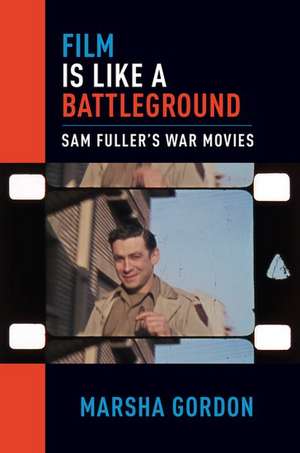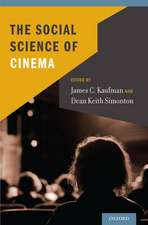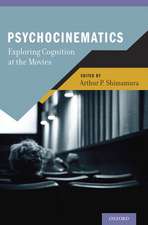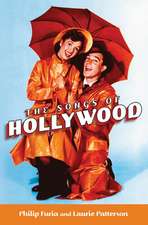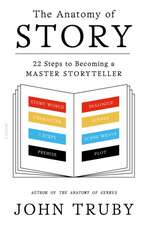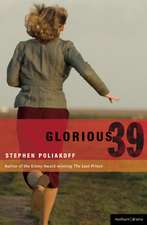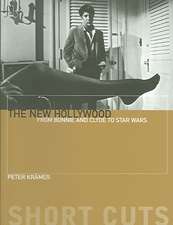Film is Like a Battleground: Sam Fuller's War Movies
Autor Marsha Gordonen Limba Engleză Paperback – 9 mar 2017
| Toate formatele și edițiile | Preț | Express |
|---|---|---|
| Paperback (1) | 241.94 lei 32-37 zile | |
| Oxford University Press – 9 mar 2017 | 241.94 lei 32-37 zile | |
| Hardback (1) | 718.50 lei 32-37 zile | |
| Oxford University Press – 18 mai 2017 | 718.50 lei 32-37 zile |
Preț: 241.94 lei
Preț vechi: 298.96 lei
-19% Nou
Puncte Express: 363
Preț estimativ în valută:
46.30€ • 49.51$ • 38.60£
46.30€ • 49.51$ • 38.60£
Carte tipărită la comandă
Livrare economică 07-12 aprilie
Preluare comenzi: 021 569.72.76
Specificații
ISBN-13: 9780190269753
ISBN-10: 0190269758
Pagini: 328
Ilustrații: 88 illus.
Dimensiuni: 155 x 234 x 25 mm
Greutate: 0.52 kg
Editura: Oxford University Press
Colecția OUP USA
Locul publicării:New York, United States
ISBN-10: 0190269758
Pagini: 328
Ilustrații: 88 illus.
Dimensiuni: 155 x 234 x 25 mm
Greutate: 0.52 kg
Editura: Oxford University Press
Colecția OUP USA
Locul publicării:New York, United States
Recenzii
Film Is Like a Battleground, besides being a highly readable and cogently written analysis of the director's war films, is archetypal as a potential textbook. Gordon shows us how to base our writing on factual, authentic sources and how to weave these empirical findings into a work of historiography and humanities scholarship.
Marsha Gordon's book is an engaging, lucidly written work of original and highly useful scholarship.
Film Is Like a Battleground reminds readers of how Sam Fuller carried his own personal history and the history of his adopted country into the stories he created, unafraid to testify, unafraid to arouse emotion, unafraid to reveal complexities, contradictions, and even despair. In confronting the difficult legacy of his adopted country, in raising questions about what it means to be an American, Fullers work provides a much-needed reminder of what true patriotism looks and sounds like
Marsha Gordons book on Fuller is part biography, part critical analysis, and its eminently worth reading on both counts. Primarily shes engaged in making connections between Fullers years with The Big Red One (aka the 1st Infantry Division) during World War II -- the seminal experience of his life -- and his filmmaking career ... Gordon emerges with some stunning informationGordons book leaves no doubt that the war was the making of Fuller as an artist and he knew it while it was still happening.
It not only focuses on Fullers war movies but brings hitherto unknown archive material to light resulting in that rare combination of stimulating critical insights and very relevant excavation ... Using archival sources in an admirable and penetrating manner, Gordon succeeds in this projectGordons detailed researches into the Fuller archives often result in new discoveries ... reviewing Fullers legacy from another perspective to reveal its inherent humanity and relevance to an era in which we are again subject to the absurdity that Fuller earlier recognized.
In the engaging Film Is Like a Battleground: Sam Fullers War Movies, Marsha Gordon explores how Fuller grappled with trauma, memory, and the impossibility of realistically representing war across his eight combat and Cold War films as well as his television and script work ... Fuller was a master storyteller, and Gordons meticulous research reorients and adds texture to many of the yarns he told not only about his films, but also about his own lifeGordons focus allows her to provide sustained attention to individual pictures, interweaving discussion of their production and reception with detailed analysis of the films themselves and their political, cultural, and generic contexts.
Marsha Gordon's book is an engaging, lucidly written work of original and highly useful scholarship.
Film Is Like a Battleground reminds readers of how Sam Fuller carried his own personal history and the history of his adopted country into the stories he created, unafraid to testify, unafraid to arouse emotion, unafraid to reveal complexities, contradictions, and even despair. In confronting the difficult legacy of his adopted country, in raising questions about what it means to be an American, Fullers work provides a much-needed reminder of what true patriotism looks and sounds like
Marsha Gordons book on Fuller is part biography, part critical analysis, and its eminently worth reading on both counts. Primarily shes engaged in making connections between Fullers years with The Big Red One (aka the 1st Infantry Division) during World War II -- the seminal experience of his life -- and his filmmaking career ... Gordon emerges with some stunning informationGordons book leaves no doubt that the war was the making of Fuller as an artist and he knew it while it was still happening.
It not only focuses on Fullers war movies but brings hitherto unknown archive material to light resulting in that rare combination of stimulating critical insights and very relevant excavation ... Using archival sources in an admirable and penetrating manner, Gordon succeeds in this projectGordons detailed researches into the Fuller archives often result in new discoveries ... reviewing Fullers legacy from another perspective to reveal its inherent humanity and relevance to an era in which we are again subject to the absurdity that Fuller earlier recognized.
In the engaging Film Is Like a Battleground: Sam Fullers War Movies, Marsha Gordon explores how Fuller grappled with trauma, memory, and the impossibility of realistically representing war across his eight combat and Cold War films as well as his television and script work ... Fuller was a master storyteller, and Gordons meticulous research reorients and adds texture to many of the yarns he told not only about his films, but also about his own lifeGordons focus allows her to provide sustained attention to individual pictures, interweaving discussion of their production and reception with detailed analysis of the films themselves and their political, cultural, and generic contexts.
Notă biografică
Dr. Marsha Gordon is Associate Professor of Film Studies at North Carolina State University. She is the author of Hollywood Ambitions: Celebrity in the Movie Age, co-editor of Learning with the Lights Off: A Reader in Educational Film, and the former editor of The Moving Image journal.
